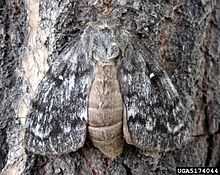- Dendrolimus superans
-
Dendrolimus superans 
Scientific classification Kingdom: Animalia Phylum: Arthropoda Class: Insecta Order: Lepidoptera Family: Lasiocampidae Genus: Dendrolimus Species: D. superans Binomial name Dendrolimus superans
(Butler, 1877)[1]Synonyms - Odonestis superans Butler, 1877
- Dendrolimus sibiricus Tschetverikov, 1908
The White-lined silk moth, Sakhalin silk moth, Japanese hemlock caterpillar, Siberian silk moth, Siberian moth, Siberian conifer silk moth, Siberian lasiocampid or Larch caterpillar (Dendrolimus superans) is a moth of the family Lasiocampidae.
Contents
Distribution
It is found in Kazakhstan, China, Russia, Korea and Japan.
Description
The wingspan is 60–102 mm. The colour ranges from light yellowish-brown or light grey to dark brown or almost black. The forewings are crossed by two dark stripes and there is a white spot situated at the centre of the forewing.
Life Cycle
The length of the life cycle varies from two to four calendar years depending on population density. The larvae of the males have five to nine instars, while those of the females have six to ten. Adults are on wing from the end of June to the beginning of August. The larvae (second to third instars and fifth to sixth instars) overwinter under the forest litter. Pupation takes place from mid June to late July.[2] There are cycles of slow build-up of population over several years, reaching a peak (outbreak) followed by a population collapse.[3]
Host plants and damage
The larvae feed on Larix, Picea and Pinus species. It is the major defoliator of coniferous forests in Asian Russia.
Subspecies
- Dendrolimus superans superans -White-lined silk moth, Sakhalin silk moth, Japanese hemlock caterpillar (Sakhalin, the Kurile Islands and northern Japan)
- Dendrolimus superans sibiricus Tschetverikov, 1908 -Siberian silk moth, Siberian moth, Siberian conifer silk moth, Siberian lasiocampid or Larch caterpillar (north eastern Kazakhstan, Urals, Siberia and the Far East)
Gallery
References

This article on a moth of the Lasiocampidae family is a stub. You can help Wikipedia by expanding it.




